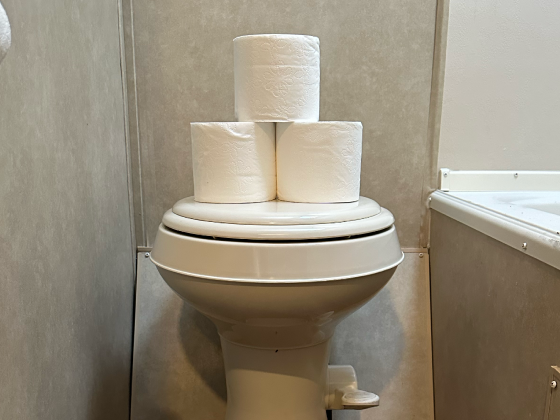Key Points:
- Portable cassette and composting toilets can be a useful and effective alternative to the full-sized holding tank systems typically found in larger RVs and trailers.
- Though Cassette toilets and composting toilets are great options for some campers, they do have some downsides and require regular, hands-on maintenance.
As many travelers move toward living in vans, RVs, trailers, or DIY busses and vans, portable camping toilets are becoming a widely used alternative to public restrooms. These toilets, called Cassette toilets and composting toilets, are, for many travelers, convenient and easy to use. They are a great alternative to the full-sized holding tank systems typically found in larger RVs and trailers. But these toilets can feel “different” since they don’t operate like a normal, traditional toilet in a home or RV. But not to worry! In this guide, we’ll be diving into what portable cassette toilets and composting toilets are as well the benefits and drawbacks of using a camping toilet.
Cassette Toilets
A cassette toilet is essentially a toilet that has been permanently installed in your RV, camper, trailer, or van with a removable black (waste) tank - often accessible from the exterior of the vehicle. These Cassette toilets can be installed in an RV, van, or trailer and the black tank can be dumped by hand by simply removing the tank and dumping it out in an appropriate receptacle or drain.
A Cassette toilet is composed of:
- The actual toilet bowl, installed inside the camper.
- The removable black tank, which is normally accessible from the outside of the camper (normally about 5-gallon capacity)
- A water source.
After you go to the bathroom in a cassette toilet, a valve on the toilet can be engaged to allow waste to flow into your black tank where it will be stored until you remove the tank and dump out the contents. Many Cassette systems have a light that indicates when the black tank is full.
The Benefits Of A Cassette Toilet
There are some benefits of using cassette toilets over a traditional full-sized holding tank system:
- Simple and easy to use.
- More flexible options for dumping.
The Drawbacks Of A Cassette Toilet
Though Cassette toilets have some great benefits, there are also some substantial downsides to using a cassette toilet:
Because of their construction and water usage, cassette toilets are some of the most likely types of RV toilets to present the following problems:
- Odor Issues. Cassette toilets are very compact and have very small ventilation systems and waste storage tanks. As a result, it takes more upkeep to control strong smells and solid waste. Without consistent treatment, odors will build up very quickly inside the waste storage tank.
- Waste Management Headaches. Since you must dump a Cassette toilet’s black tank by hand, you are very up-close and personal with your waste. Many users see this as a deal breaker and avoid using a Cassette toilet altogether.
Things To Remember When Using A Cassette Toilet
If you choose to go the cassette toilet route, we strongly recommend that you avoid using chemical treatments to control odors. Chemical treatments merely mask odors; they do not eliminate them. Moreover, some of these chemical treatments can contain caustic chemical ingredients. In fact, some chemical treatments (particularly those that use formaldehyde) are actually dangerous to your health. Formaldehyde has been linked to numerous severe diseases and health problems, including ALS and cancer (learn more about this here.)
These chemical treatments also contain fragrances that are oftentimes more difficult to live with than the smell of the waste itself!
The truth is that cassette toilets can easily become very smelly if not treated correctly, and it takes a lot of due-diligence to control these odors. The best option to mitigate odors is often to consistently dump your cassette toilet to prevent residue build-up and odors. The key is to not let waste stagnate inside your cassette toilet.
Guide Continued Below

Sign Up + Save
Join our newsletter and save $5 on your next order! Plus, get exclusive members-only discounts, access to our library of downloadable guides, and insider information on new products and promotions.
Composting Toilets
Now that you know the benefits and drawbacks of Cassette toilets let’s explore composting toilets.
At its most basic level, a composting toilet works by keeping liquid waste and solid waste separate. Solids flow into one container, and liquids flow into another container. Both of these tanks are removable. In the solid waste container, a composting material (ground-up coconut husks, peat moss, sawdust, etc.) helps to break down the waste. A fan will then blow air over the solid waste and out of the RV, drying out the waste and forcing odors out of the RV. The liquid is captured in a separate container that can be dumped out.
The Benefits Of Composting Toilets
Composting toilets do have some benefit which include:
- They use no water and produce no water.
- Because they use no water, there is no plumbing that goes to or from a composting toilet.
- There are more options for dumping.
- Composting toilets do fairly well in the controlling of odors.
It’s also good to note that an RV holding tank treatment is not always necessary in a composting toilet (a composting toilet should do most of the work on its own). However, if you are dealing with odors from urine, bacteria holding tank treatments can help mitigate odors.
The Drawbacks To Using Composting Toilets
There are some drawbacks to using a composting toilet that you’ll also want to keep in mind:
- You must keep the solids and liquids separate, which can be difficult from a logistics standpoint.
- Since you must dump it by hand, you can be very up-close and personal with your waste (Just like a Cassette toilet).
- You can experience occasional urine odors.
- They require a moderate amount of maintenance and work.
Also keep in mind that when temperatures drop below 50° Fahrenheit, the naturally-occurring aerobic bacteria in a composting toilet holding tank will begin to slow down in their breakdown processes. If the temperature remains low for an extended period of time, the bacteria may even die off completely. This will leave you with the very odors you were trying to avoid by choosing a composting toilet in the first place. Because of this, it is incredibly important to keep your composting toilet from getting too cold.
Final Thoughts
Both Cassette toilets and composting toilet have their place in the camping world, but it is also important for a camper to know what he or she is getting into when choosing the take the “non-traditional” toilet route. We hope this guide has helped make the decision between these two options more easy. If you have any questions, please contact us, we are always more than happy to help. Happy camping!

Prevent Common Problems In Your Tanks!
From misreading sensors, preventing clogs, or eliminating odors, we've got you covered no matter how you camp! All our best holding tank tips and trick information plus more can be found conveniently in one place when you download our FREE Unique Method Field Guide. Achieve holding tank bliss today!
Get The Free Download



